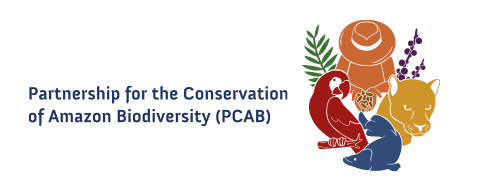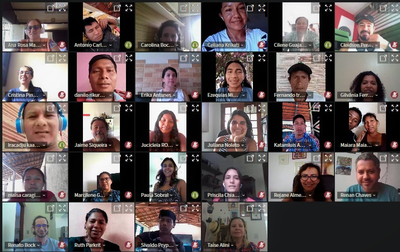Training promotes Territorial and Environmental Management in Indigenous Lands
Indigenous communities in Maranhão and Tocantins, together with social workers and government officials, participated in the “Pryhhrejara Wiràmiri” training program – Territorial and Environmental Management in Indigenous Lands. The course title, which means "flock of birds" in the Timbira and Tenetehara languages, was chosen by local Indigenous people with the aim of stressing the role of course participants as those that will later sow the knowledge acquired.
Training has been delivered online since March this year. It aims to inform discussions and management initiatives in Indigenous Lands and other traditional territories in the Amazon. In order to ensure that course activities respect the social distancing measures imposed as a result of the pandemic, a virtual learning platform was created to monitor students in remote places with limited internet access. Information materials and videos are available to guide participants on how to use the tool.
A mobile app has been developed to increase access to the distance-learning platform. It provides a quick overview of course contents in a functional way, and can be used offline or adapted to old cell phones. To ensure conditions of participation, 48 cell phones with the installed app were distributed to students, with all functions enabled.
“It's good to be in this program. I had to miss some classes due to internet limitations in remote areas, but I've still been able to assimilate the contents. The classes are very interesting, as they focus on the reality of our communities," says Ana Rosa Marques, an environmental analyst at the Brazilian Institute for the Environment and Renewable Natural Resources (IBAMA), who also works with the federal program on Indigenous fire-brigades in Maranhão.
The course is part of the Integrated Environmental and Territorial Management in Eastern Amazon Indigenous Lands project, supported by PCAB. Created in 2019 through a cooperation agreement between USAID/Brazil and the Indigenist Work Center (CTI), the program also counts on the support of the Society, Population, and Nature Institute (ISPN), the Wyty-Catë Organization of Timbira Communities of Maranhão and Tocantins, the Maranhão Indigenous Organizations Network (COAPIMA), and the Maranhão Indigenous Women Network (AMIMA).
Participatory planning – Representatives of these entities integrated a teaching group responsible for planning, monitoring, and evaluating course activities. A partnership was signed with the State University of the Tocantins Region in Maranhão (UEMASUL) for the final course certification.
“For me, this training program has turned out to be a very profound knowledge tool, and has contributed to my learning,” says Carmilene Guajajara, from the Tabocal village at the Rio Pindaré Indigenous land (MA).
There are a total of five modules: four on the virtual platform, and possibly one final face-to-face seminar. To carry out the activities, weekly virtual classes were programmed with the simultaneous participation of students and teachers. Additional activities on the platform and through WhatsApp can be completed at any time chosen by the participants.
Background materials (texts and videos) are made available on the platform each week, together with related tasks. The teachers are external guests, including university professors, representatives of social and environmental organizations, and Indigenous leaders.
“Participating in this Environmental and Territorial Management Training Program has been fundamental to my professional development. Direct contact with Indigenous participants is extremely enriching in terms of breaking paradigms and improving day-to-day practices,” says IBAMA's environmental analyst Taíse Alini Ribeiro, who also works with the federal program on Indigenous fire-brigades in Maranhão.



